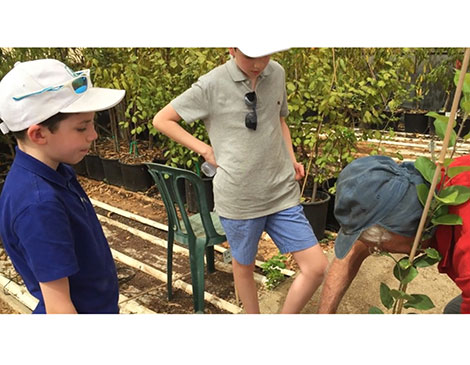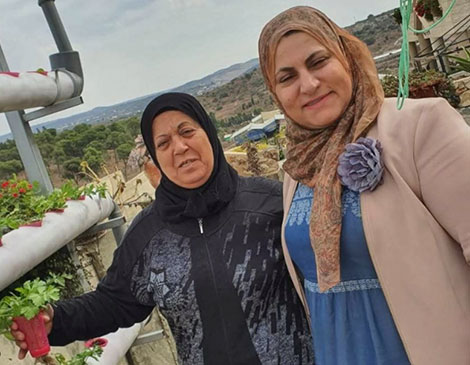Steven Hoffen Q&A: On the Cleveland International Kids Film Festival, His Documentary and More
by Zach James | Feb. 27, 2022 | 2:00 PM

Courtesy Steven Hoffen
Steven Hoffen is no ordinary eighth-grader. Sure, the 13-year-old goes to school and watches Marvel movies, but he’s also behind an award-winning documentary short film entitled Growing Peace in the Middle East, which will become available late this year. Since being released, the film has gone on to spark a movement through his non-profit, Growing Peace Inc., around hydroponic farming, a method used to grow plants where there’s no usable soil.
His documentary follows his trip to Sindyanna of Galilee in Israel, where Jewish and Palestinian women work together to grow hydroponic produce as well as understanding between their cultures and differences. We spoke with Hoffen, who lives in New York City, ahead of his film being shown at the Cleveland International Kids Film Festival on March 11.
Q: When did you know that you wanted to make your film, Growing Peace in the Middle East? And what would you say was the biggest inspiration for it?
A: So, I went to Sindyanna in the summer of 2019. And I loved all the people that I met there; I loved all their all their different projects. When I found out that they had a hydroponics project, I was very interested in it; I wanted to do something related to it. I remembered I was really interested in documentary filmmaking. And what got me interested in that was the David Attenborough documentaries I watched on Netflix. So, I created this documentary about Sindyanna and Sindyanna’s hydroponics project.
Q: What was it like to visit Israel and how did you get in contact with Sindyanna?
A: Oh, I've been to Israel a couple of times, but it's extremely hot there. The weather is really nice. And yeah, I mean, it's a lot different than New York. When I first went there, I visited [Sindyanna]. I actually met the founder, Hadas. And so I kept in touch.

Q: Did you face any roadblocks because you're so young and making a film? Was Sindyanna willing to work with you from the start?
A: Well, I mean, at first, I thought that COVID was going to be a roadblock because everything was online, and actually turned out to be the perfect time to do it. Because you could do all the interviews through Zoom and so you didn't actually have to pay to go there. Since it's not really an acting movie, just a documentary, you don’t have to interact with other people. So, all of it could be done on my computer. They all said yes to being asked to be interviewed
Q: What was your favorite part of the filmmaking process; what do you think you got the most out of? What was the hardest part?
A: Well, I really liked the editing process. It’s really fun to find the media and pictures to relate to what I'm saying in the video. But relating to what I got the most out of, I probably learned how to like throughout all my interviews, I got a lot better at writing good interview questions for my specific purpose because I was really curious. And I also needed a lot of information. So, I knew I had to make my interview questions very specific. The hardest part was also probably the editing because I wasn't familiar with editing. I'd been kind of exploring different editing software before, but I didn't really know how to edit, so I had to get taught how to. Once I kind of knew the basics, it was pretty easy from then on out.
Q: Do you think that after working on this, you want to continue working on documentaries or just film in general? Even into adulthood possibly?
A: I'm in the process of doing a new project. And I'm going to be creating a short series of videos on us building a hydroponic system in a food bank in Israel. This food bank is specifically for refugees who come from places in Africa, like Eritrea and Sudan, who come to Israel and don't really have enough food to eat. So, I'm going to be making a couple of short videos about that. I'm not really sure what I want to do as an adult. But filmmaking is definitely pretty interesting.
Q: What does it mean to you to be a part of the Cleveland International Kids Film Festival? And what do all these awards you’re getting mean to you?
A: I read some things about this film festival and it's very cool. I haven't watched a lot of the other films that are here, but it's definitely an honor to be accepted. At first, I didn't really think I was gonna get a lot of awards by just submitting to film festivals and FilmFreeway anyways, and so I was really excited and surprised that I got accepted into a lot of film festivals.

Q: What was the process of getting your non-profit, Growing Peace Inc., going?
A: What really started it, on the trip to Israel in 2019, I went to the Volcani Institute. I was introduced to a new project, the food bank project. The food bank caters to African refugees who come to the food bank in Israel. That started the idea behind Growing Peace Inc., to have a series of projects I could do.
Q: What’s been the most fulfilling part of running it?
A: Well, it’s a relatively new foundation. Other than the Sindyanna film, which was way before Growing Peace Inc. even existed, we've only really had the hydroponic food bank project. We raised a lot of money in order to build the hydroponic system there. So, I’m really proud to be able to be part of that.
Trending
-
1
-
2
-
3
-
4
-
5










